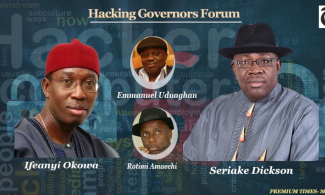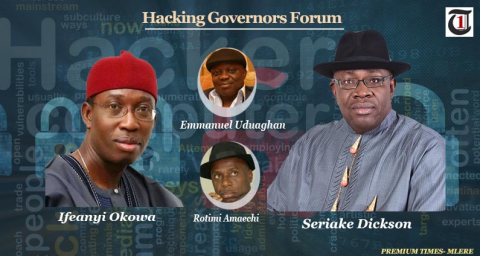
Nigerian politicians have driven their illegal surveillance and communication interception programs to new heights with the acquisition of the latest tracking technology that allows them decrypt telephone calls made over 3G networks in real time.
The technology could also track the exact position of a user, even when abroad.
The politicians implementing this new technology are old names in the game of illegal surveillance. Emmanuel Uduaghan, former governor Delta state, got the technology and handed over to his successor, Ifeanyi Okowa. Seriake Dickson of Bayelsa who was involved in the Hacking Team scandal is also involved in this.
A PREMIUM TIMES investigation spanning months revealed that a Bulgarian digital surveillance company, Circles 3G, offered the technology with which the governors secretly violated the privacy of citizens, while federal government authorities, themselves vulnerable, looked away.
The entrance of Circle 3G into Nigeria’s unregulated mass Internet surveillance market brings the number of mass surveillance systems operational or tested in Nigeria to eight. It also widens the range of Nigerians susceptible to surveillance and privacy abuse by politicians.
Rivers state
Former Rivers State Governor, Rotimi Amaechi, who is now Nigeria’s transport minister, was the first Nigerian politician to demand a Circle 3G’s telephone tracking technology as far back as 2010.
He requested the tool the same year Nadezhda Edie-Petrova Ropleva established Circles. In an offer letter dated 30 June 2010, and signed by the then Secretary to the State Government, Sovens Okari, Rivers State Government invited V&V Limited to supply the gadgets for N2.3 billion. The contract did not go through, however. A breakdown in relationship between Mr. Amaechi and V&V Limited meant funds were never released for the project.
When contacted, Mr. Amaechi said he was unaware of the project. He argued that there was no record of fund releases for the project.
Two years earlier, Mr. Amaechi had picked up a similar gadget, the C4i (Command, Control, Communications, Computers, and Intelligence) technology deployed by an Israeli military security firm, MPD Systems. Mr. Amaechi had described the C4i as a tool to aid federal security in combating militancy and kidnappings within the state. But it was more than that. C4i was the perfect ‘federal’ cover under which Amaechi’s political spying was carried out.
Delta state
Former Delta State Governor, Emmanuel Uduaghan, holds the record of being the first Nigerian politician to use the Circles 3G tools in Nigeria.
Mr. Uduaghan doled out N1.5 billion state funds to sign up for the service in February 2012. He also paid a yearly service fee of N31.9 million.
After Mr. Uduaghan left office, he handed over the tools to the new governor, Ifeanyi Okowa, who recently signed a two year contract to extend the maintenance of the service.
Although the police headquarters in Abuja owns a Circles 3G communication interception service which it pays N63 million annually to maintain, the Delta state government argues its gadgets were bought for the police.
“My boss has no need to monitor any politician,” Ehiedu Aniagu, chief press secretary to Mr. Okowa said.
PREMIUM TIMES investigation shows that the gadgets are run by V & V Limited and employees of the governor, rather than public security agents.
Bayelsa State
The Bayelsa State Governor, Seriake Dickson, switched to Circles 3G’s services in July 2012, after his contract with Italian Hacking Team failed to intercept as much as the government wanted.
Mr. Dickson doled out N1.7 billion to acquire Circles 3G’s service with an extra annual maintenance fee of N31.9 million. The amount N1.7 billion is N200 million higher than what his Delta State counterpart paid to the same firm.
The governors acquired the tools without the requisite End User Certificates – a license issued by the office of the National Security Adviser to entities seeking to import defence equipment.
In fact, individuals are prohibited from handling such mass surveillance equipment. Only state actors like the police are allowed by law to own them.
Several inquiries to the Bayelsa State Government for comments were ignored. Text messages were not replied to, and calls were not returned.
Why Circles 3G is Bad in the Hands of Politicians
Circles can track the exact position of 3G telephones in real time in almost any part of the world. But that’s not the worst thing about Circles.
Circles is also able to intercept calls and internet traffic in the 3G (UMTS) networks, a capability that was before now impossible without the cooperation of the telephone companies. Calls made over 3G networks are usually encrypted end to end while the telephone companies held the decryption keys. Previous techniques relied on compelling the targeted phone to switch from 3G to 2G which was easier to decrypt in real time.
To get around the problems associated with intercepting 3G mobile phone calls in real time, Circles established a phone company in Bulgaria last year.
According to a report by Intelligence Online, Circles, with its status as a network provider in Bulgaria, obtains encryption keys by direct connections to the inter-operator networks of Magyar Telekom, Telecom Italia and Cogent in the United States. Circles’ connection with these three networks gives it access to decryption keys held by mobile telephone companies all over the world.
Our investigations show that in the run up to the December 2015 elections in Bayelsa, Mr. Dickson used this spying tool to track his prime challenger, Timipriye Sylva. Mr. Dickson did not stop at Sylva, he also tracked phone numbers belonging to Mr. Sylva’s wife, aides and loyalists.
This piece of technology was also deployed in hunting down Tonye Ekio who was incarcerated by the governor, late 2013, over a Facebook post that was critical of Mr. Dickson’s government.
An ex-militant, Africanus Ukparasia, also known as “General Africa”, was also a target of Mr. Dickson’s surveillance.
Although Circles sold the technology to Mr. Dickson with an apparent understanding to use it within his territory, the governor used it to eavesdrop on targets far away from Bayelsa. For instance, some of the daily target reports seen by PREMIUM TIMES shows Mr. Dickson tracing Mrs. Sylva’s phone numbers to locations in Abuja. Another report shows him tracing a target called E-Genle to a location outside the country.
Mr. Dickson’s use of his spying technology, bought with state funds, suggests he did not follow any rule requiring that the privacy of individuals be respected. It also means every politician, and anyone with a phone number, could be victim of the abuse.
It is not clear who Delta state’s top politicians, Messrs Uduaghan and Okowa directed their surveillance on, but PREMIUM TIMES investigations found that this tool was installed in the governor’s lodge, and not under the control of government security services.
Ethically Wrong
The Nigerian surveillance industry is loosely regulated. Participation is controlled by weak laws.
While the United Nations’ resolution on digital privacy recommends that any instance of interference be subject to a careful and critical assessment of its necessity, legitimacy and proportionality, none of these frameworks exist in Nigeria.
The Nigerian cybercrime law which can be extended to restrain these politicians prescribes a prison term of not more than two years, or a fine of N5 million or both for convicts, making it possible for anyone with financial and political muscle to acquire and use it in any dimension of interest.
The Muhammadu Buhari-led administration does not appear to be concerned about regulating Nigeria’s digital surveillance and interception market.
In an interview with PREMIUM TIMES, Femi Adesina, one of the president’s spokesperson, admitted that discussions around the topic “has not come up at that level”.
Gbenga Sesan, executive director of Paradigm Initiative Nigeria, said the first step would be to subject all acquisition, deployment and reviews to judicial oversight through mandatory court warrants.
“Nigeria does need a defined framework for any surveillance activity to ensure that abuse doesn’t continue as this case — and others like the Hacking Team engagement — have shown,” Mr. Sesan said.
Mr. Sesan is currently promoting a Digital Rights and Freedom Bill in the National Assembly. The bill, which makes provisions for the control and regulation of surveillance and lawful interception, has passed first reading in the House of Representatives.
